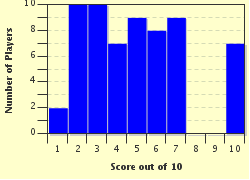Quiz Answer Key and Fun Facts
1. In 1939 Éire (Ireland) was the only member of what organisation to remain neutral?
2. In Éire (Ireland) World War II is referred to as what?
3. During World War II did Éire (Ireland) enforce her neutrality by interning combatants found on her soil?
4. During World War II Éire (Ireland) breached its neutrality numerous times. Which of the following did it NOT do?
5. Faced with potential invasion from either the Allied or Axis powers the full time Irish Defence Forces grew from 10,000 strong at the start of World War II to what figure by 1945?
6. With reference to Éire (Ireland) in World War II, what was Plan W?
7. At 10:40 pm on Easter Tuesday, 15 April 1941 up to 200 German bombers arrived over Belfast, Northern Ireland's capital. By the time they left at 5am some 900 people were dead, the highest death toll for a single night raid outside London. How did Éire (Ireland) respond?
8. During World War II a number men serving in the Irish Defence Forces enlisted in the British army. How many men did so?
9. When these men returned to Éire (Ireland) they faced a number of sanctions imposed by the Irish government. Which of the following was NOT one of them.
10. There were numerous reasons for Éire (Ireland) to remain neutral during World War II, which of the following was NOT one?
Source: Author
CuddlyNutter
This quiz was reviewed by FunTrivia editor
bloomsby before going online.
Any errors found in FunTrivia content are routinely corrected through our feedback system.

